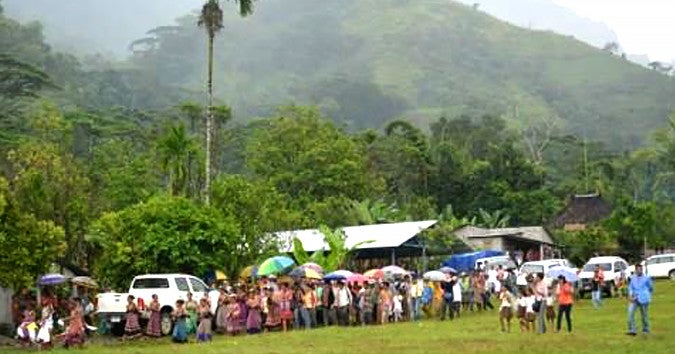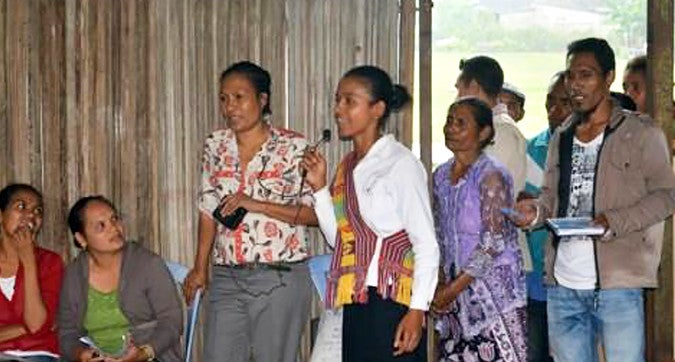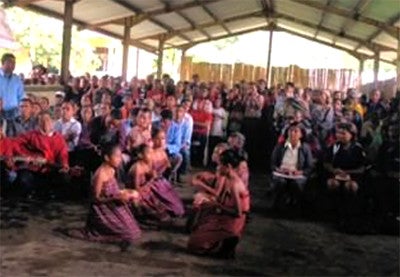Opening Dialogue and Expanding Partnerships for Equitable Development in Timor-Leste
Date:
Author: Women, Peace and Security Team/UN Women
“Together, in partnership, we can bring this nation forward,” Said Arantes Isac Sarmento, Deputy District Administrator, Manufahi.
Surrounded by fertile mountain crops and an envelope of early morning fog, over 100 people of Holarua and Daisua villages in the sub-district of Same came together on 6 June 2014 to voice their perspectives on issues affecting security and the overall well-being of their communities.
The Minister for Social Solidarity, four Members of Parliament, representatives from the Secretary of State for the Promotion of Equality, the Secretary of State for Security, district authorities and UN agencies gathered with women and men, of different ages and generations, including veterans and local leaders, representing diverse groups in communities. The annual Open Day Dialogue on Women, Peace and Security was the first time such a discussion was held with the two villages and was facilitated by UN Women through the national NGO Asia Pacific Support Collective Timor-Leste (APSC-TL), with the generous support of the European Union, and Governments of Australia and the United Kingdom.

Since the Open Day Dialogues began globally in 2010 to commemorate the 10th anniversary of the United Nations Security Council resolution 1325, UN Women supported organization of four Dialogues in Timor-Leste. In line with the resolution’s aim to advance women’s leadership and participation in conflict prevention and peacebuilding, the key message of the day focused around partnership and community-wide engagement in order to achieve lasting peace, security and equality for all.
As acknowledged by Deputy District Administrator Arantes Isac Sarmento, working towards gender equality “doesn’t mean that men have no value.” His remarks encouraged collaboration and a shift in the status quo - “Together, in partnership, we can bring this nation forward.”
This message was reiterated by Janet Wong, Country Representative of UN Women Timor-Leste, who remarked, “Achieving gender equality is not the responsibility of women. It is the responsibility of all of us, women and men, girls and boys, all sectors of society… Engaging people in development is not a formality, it is our collective duty.”
Consultations organized by APSC-TL prior to the Open Day enabled women’s groups and other community members to prepare specific recommendations for each of the Ministries, Secretaries of State, and UN agencies, in line with the pillars of the Women, Peace and Security agenda.

Across recommendations, the increased leadership and participation of women was a recurrent theme. The National Parliament was asked to ensure female parliamentarians, who make up only 38 percent of the Parliament, continue to support programmes for women in rural areas and monitor implementation of policies.
Addressing National Police recruitment processes which discourage women’s participation, for example through prohibiting women from having children during the two-year training period, was suggested to the office of the Secretary of State for Security. UN Women was asked to continue to provide support to civil society organisations and government to promote the voices of women in decision-making at all levels and capacity building around economic development.Regarding protection from gender-based violence (GBV), community-members requested the presence of the Referral Network at the sub-village level, and greater socialization of the National Action Plan on Gender Based Violence and Law Against Domestic Violence for remote communities, local authorities and non-governmental organisations. Closer examination of processes around the prosecution of GBV cases was also noted as a priority.
The Dialogue highlighted the importance of improving basic infrastructure such as better roads for ensuring ambulances were able to provide emergency health services and transporting products to facilitate the expansion of local businesses. Village members also advocated for closer monitoring of progress with school facilities and teaching, and raised concerns around local housing and land distribution.
The Minister for Social Solidarity and other government representatives, Parliamentarians and development partners acknowledged recommendations, which were presented in writing to each representative. They agreed to accelerate tribunal processes, facilitate processing of pending cases of elderly pensions, provide support for ex-combatants, particularly women facing discrimination, and social protection for others in need, such as people with disabilities.

The Dialogue concluded with the signing of Small Grants Agreements with four women-led self-help groups, contributing to enhanced income-generating activities such as traditional weaving, horticulture and fish breeding, and toward the renovation of a community resource centre to facilitate access to expanded markets, which will benefit up to 1000 families where 1,600 women and 1,500 are direct beneficiaries. The words of MP Albina Freitas, Vice President of the Women's Parliamentary Group of Timor-Leste, capture the sentiment of the Dialogue best: “Believe in yourselves. Together we can!”